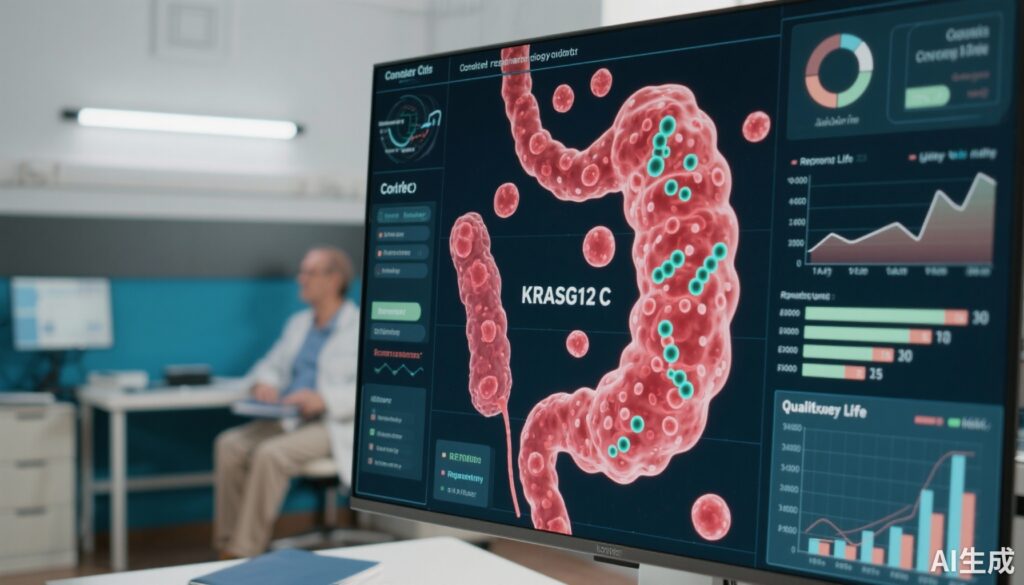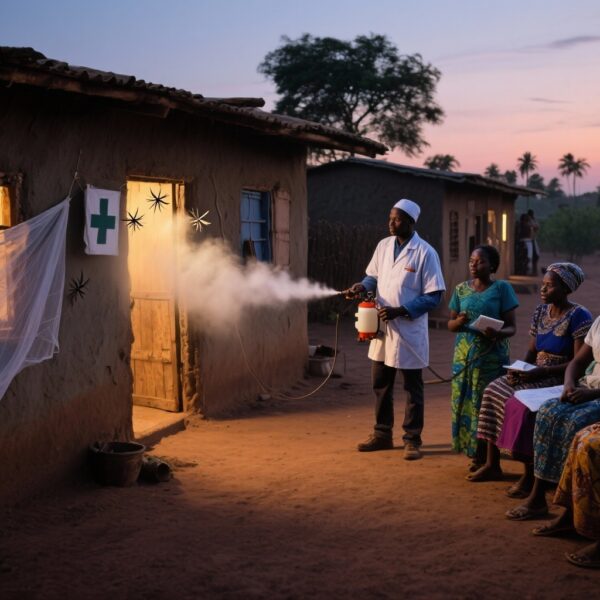Highlight
– Sotorasib plus panitumumab significantly improved patient-reported outcomes (fatigue, pain, quality of life, physical function) over standard care in KRASG12C-mutated metastatic colorectal cancer.
– The combination demonstrated prolonged progression-free survival alongside enhanced quality of life.
– High compliance with patient-reported outcome assessments supports the robustness of quality of life findings.
– This treatment offers a novel therapeutic option for chemorefractory metastatic colorectal cancer patients harboring KRASG12C mutations.
Study Background and Disease Burden
Metastatic colorectal cancer (mCRC) represents a major clinical challenge worldwide, especially in patients exhibiting resistance to standard chemotherapy regimens. A subset of these tumors harbors the KRASG12C mutation, an oncogenic driver mutation historically deemed “undruggable” until recent advances. Patients with KRASG12C-mutated chemorefractory mCRC have limited treatment options and generally poor prognosis, compounded by symptom burden and diminished health-related quality of life (HRQoL).
The phase 3 CodeBreaK 300 study addresses this unmet need by investigating sotorasib, a targeted inhibitor of KRASG12C, in combination with panitumumab, an epidermal growth factor receptor (EGFR) inhibitor. Previous data from this trial established improved progression-free survival compared to investigator’s choice of either trifluridine-tipiracil or regorafenib, the current standard care options for this patient population. However, the impact of this novel combination on HRQoL, an essential factor for patients facing progressive metastatic disease, remained to be elucidated.
Study Design
The CodeBreaK 300 trial was a randomized, open-label, phase 3 clinical study enrolling adult patients (≥18 years) with centrally confirmed KRASG12C-mutated metastatic colorectal cancer who were chemorefractory and had measurable disease per RECIST v1.1 criteria. Eligible patients had progressed after standard first and second-line chemotherapy including fluoropyrimidine, oxaliplatin, and irinotecan, and had Eastern Cooperative Oncology Group (ECOG) performance status of 0 to 2.
Patients were randomized 1:1:1 to one of three arms: sotorasib 960 mg orally once daily plus panitumumab 6 mg/kg intravenously every two weeks; sotorasib 240 mg plus panitumumab at the same panitumumab dose and schedule; or investigator’s choice of standard care, comprising trifluridine-tipiracil or regorafenib, dosed per label specifications. Randomization was stratified by previous anti-angiogenic therapy, time from metastatic diagnosis to randomization, and ECOG performance status. The primary endpoint of progression-free survival was previously reported.
Secondary and exploratory endpoints included patient-reported outcomes (PROs) covering fatigue and pain (assessed by the Brief Fatigue Inventory and Brief Pain Inventory respectively), as well as Global Health Status-Quality of Life (GHS-QoL) and physical function subscales from the EORTC QLQ-C30 questionnaire. PRO assessments were obtained at baseline and at the start of each 4-week treatment cycle until disease progression or safety follow-up.
Key Findings
A total of 160 patients were enrolled between April 2022 and March 2023: 53 received sotorasib 960 mg-panitumumab, 53 received sotorasib 240 mg-panitumumab, and 54 received standard care. Median treatment durations were 6.0 months, 4.6 months, and 2.2 months, respectively.
The demographic profile included 51% female participants; 68% White, 25% Asian, with minimal representation from Black patients and others. Hispanic or Latino ethnicity accounted for 8% of participants.
Compliance for PRO assessments at week 9 was approximately 80%, consistent across groups, underpinning data reliability. Analysis employed a mixed effects model for repeated measures estimating least squares mean changes from baseline.
Results favored both sotorasib doses over standard care in all measured PRO domains at week 9:
- Fatigue (worse score = higher): sotorasib 960 mg-panitumumab showed a reduction of -0.89 (95% CI -1.80 to 0.01); sotorasib 240 mg-panitumumab reduced by -0.58 (95% CI -1.47 to 0.30) compared with standard care.
- Pain (worse score = higher): reductions were -1.45 (95% CI -2.32 to -0.58) and -1.14 (95% CI -2.00 to -0.28), respectively.
- GHS-QoL (higher scores better): improvements were 9.43 (95% CI 2.31 to 16.56) and 6.49 (95% CI -0.43 to 13.41), favoring sotorasib groups.
- Physical Function (higher scores better): gains of 5.38 (95% CI -0.01 to 10.78) and 6.34 (95% CI 1.07 to 11.62) were observed.
00352-3/asset/08b83450-030e-4900-a51d-6dcb68ca7a14/main.assets/gr4.jpg)
The time to deterioration (TTD) and changes in overall patient-reported tolerability also trended favorably for sotorasib combinations though detailed data were exploratory.
These improvements are clinically meaningful, considering the heavy symptomatic burden typically experienced by patients with chemorefractory metastatic colorectal cancer. Furthermore, longer median treatment durations in sotorasib arms suggest prolonged tolerability and potential sustained benefit.
Expert Commentary
The CodeBreaK 300 trial advances the therapeutic landscape for KRASG12C-mutated metastatic colorectal cancer by integrating molecularly targeted approaches with quality of life assessments, recognizing that control of symptoms and functional status are critical endpoints alongside traditional survival measures.
The dual inhibition strategy targeting KRASG12C and EGFR demonstrates plausible synergistic biological activity, attenuating both tumor progression and symptomatology, as evidenced by consistent improvements across fatigue, pain, physical functioning, and global quality of life domains. These findings resonate with the growing emphasis on patient-centered outcomes in oncology trials.
Notably, the study included diverse populations across multiple continents enhancing generalizability. However, the limited inclusion of patients with ECOG 2 status and minimal representation of some racial groups may necessitate cautious extrapolation in those subsets.
Limitations include the open-label design which may introduce bias in PRO reporting, though standardized and validated instruments mitigated this risk. Longer follow-up will be valuable to assess durability of HRQoL benefits and overall survival impact.
Conclusion
The phase 3 CodeBreaK 300 trial substantiates that sotorasib combined with panitumumab not only prolongs progression-free survival but also significantly improves patient-reported quality of life and symptom control in KRASG12C-mutated chemorefractory metastatic colorectal cancer. These findings support the incorporation of this regimen as a valuable new treatment option, addressing both oncologic control and patient-centric outcomes in a difficult-to-treat population.
Future investigations should focus on optimizing dosing, evaluating long-term benefits, exploring combinatorial strategies, and expanding access to underrepresented patient groups to fully realize the potential of KRASG12C-targeted therapy in colorectal cancer.
References
1. Modest DP, Fakih M, Salvatore L, et al. Health-related quality of life in patients with KRASG12C-mutated chemorefractory metastatic colorectal cancer treated with sotorasib plus panitumumab or standard of care (CodeBreaK 300): results from a phase 3, randomised clinical trial. Lancet Oncol. 2025 Sep;26(9):1240-1251. doi: 10.1016/S1470-2045(25)00352-3 IF: 35.9 Q1 . Epub 2025 Aug 11. PMID: 40812325 IF: 35.9 Q1 .2. Ostrem JM, Shokat KM. Direct small-molecule inhibitors of KRAS: from structural insights to mechanism-based design. Nat Rev Drug Discov. 2016 Nov;15(11):771-785.3. André T, Shiu K-K, Kim TW, et al. Pembrolizumab in microsatellite-instability-high advanced colorectal cancer. N Engl J Med. 2020;383:2207-2218.

00352-3/asset/339b9963-fefa-4b8a-b748-8a77e6aac0dd/main.assets/gr3.jpg)

